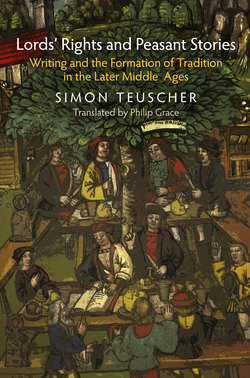Lords' Rights and Peasant Stories

Реклама. ООО «ЛитРес», ИНН: 7719571260.
Оглавление
Simon Teuscher. Lords' Rights and Peasant Stories
Отрывок из книги
Lords’ Rights and Peasant Stories
Ruth Mazo Karras, Series Editor
.....
The delineation of unwritten law was a component of innumerable disputes both in and out of court, and accordingly could take diverse forms. These were often markedly situational and implicit. In order to detect long-term developments precisely and systematically, this study concentrates on two specific types of documents: Weistümer and witness deposition records (Kundschaften). These documents were created and used in nearly all the lordships of the region during the entire period under study—although in dramatically changing forms. They are connected to a central process in the delineation of unwritten law. Weistümer concern the so-called declaration procedures (Weisungen), that is the official promulgation of local legal regulations before manorial court assemblies (Latin: placita) to which local lords regularly summoned the inhabitants of their villages (or cities, if they were strongly under the control of the lord). Most Weistümer, only a few pages long, contain lists of explicit rules pertaining to the organization of the village, such as the arrangement of farmland, manorial obligations, and aspects of criminal law. In addition, many Weistümer contain descriptions of the reasons for and process of the declaration procedure itself. By contrast, witness deposition records are concerned with the written results of witness examinations. Primarily higher courts and administrative entities carried these out in order to confirm the content or validity of particular unwritten norms in view of current events. The answers of the witnesses contain, along with explicit rules, diverse examples of compliance with or disregard for rules; accordingly, these documents could easily number several hundred pages, especially at the end of the period under study.
In research to date, the two types of documents have received strikingly different amounts of attention. Witness depositions are among the few medieval documents which, as a genre, have not yet been the subject of a greatly specialized study, but many studies of the Weistümer are available, of which several deal with the region under consideration.69 The large printed source collections, many of them begun in the nineteenth century, which encompassed legal documents as they were defined at the time, included witness depositions only rarely70 but Weistümer quite extensively.71 The assumption that Weistümer are records of oral statements misled many editors into being content with reproducing single versions that they deemed (on more or less valid grounds) to be the especially direct reflections of orality. Thus, in edited collections as in analytical research, it was seldom noted that many Weistümer exist in numerous late medieval redactions that differ from one another to varying degrees in both form and content. Precisely such discrepancies between variants furnish information about how writing was used. Above all, legal and sociohistorical investigations of the regulations contained in the Weistümer stand at the center of conventional Weistum research. It is only recently that scattered institutional72 and procedural aspects of village courts,73 or related aspects of writing culture such as the creation and use of the documents, which are of primary interest here, have attracted attention.74
.....